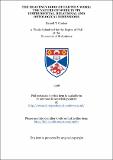Files in this item
The heavenly good of earthly work : the nature of work in its instrumental, relational and ontological dimensions
Item metadata
| dc.contributor.advisor | Keeling, Michael | |
| dc.contributor.author | Cosden, Darrell T. | |
| dc.coverage.spatial | viii, 297 p. | en_US |
| dc.date.accessioned | 2018-06-01T13:06:02Z | |
| dc.date.available | 2018-06-01T13:06:02Z | |
| dc.date.issued | 1998-06 | |
| dc.identifier.uri | https://hdl.handle.net/10023/13667 | |
| dc.description.abstract | The thesis argues that human work is a transformative activity which essentially consists of three dynamically interrelated dimensions: the instrumental, relational, and ontological dimensions. By these, along with work being an end in itself, the worker's and others' needs are providentially met; believers' sanctification is occasioned; and workers express, explore and develop their humanness while building up their natural, social and cultural environments to both protect and produce the order of this world and of the one to come. The first part shows that past and present theological evaluations of work are best understood according to this threefold description. Work's threefold nature is shown to correspond with Scripture (although here the instrumental is mainly discussed); the Patristic understanding opens up reflection toward work's ontology; and the Reformation particularly develops further the relational and ontological dimensions. In the modern Roman Catholic understanding, work's threefold nature does appear, although as seen in Laborem Exercens, the relational is given hierarchical priority over the instrumental. As modern Protestants revise old and explore new approaches, work's threefold understanding also emerges. However, the dimensions need further interrelated development, and the ontological needs to be more adequately expounded. The second part of the thesis develops work's ontology. A teleological framework is first established in dialogue with Alasdair MacIntyre and Oliver O'Donovan showing that eschatological and protological purposes and ends are essential for understanding a thing's nature (constitutionally and ethically). This builds toward a theological anthropology where an interpretive survey and interaction with Colin Gunton's anthropology highlights the necessity of relational and functional concepts. The ontology of work is further developed in dialogue with Jürgen Moltmann's anthropology. Work is shown to be a fundamental facet of created human existence, initially a part of God's creation, and in the resurrection a fundamental part of God's coming new creation. Finally, the overall proposal, a definition of work, redraws the boundaries for a theology of work, and functions as a dynamic model for ethically evaluating work. | en_US |
| dc.language.iso | en | en_US |
| dc.publisher | University of St Andrews | |
| dc.subject.lcc | BT773.C7 | en |
| dc.subject.lcsh | Good works (Theology) | en |
| dc.title | The heavenly good of earthly work : the nature of work in its instrumental, relational and ontological dimensions | en_US |
| dc.type | Thesis | en_US |
| dc.type.qualificationlevel | Doctoral | en_US |
| dc.type.qualificationname | PhD Doctor of Philosophy | en_US |
| dc.publisher.institution | The University of St Andrews | en_US |
This item appears in the following Collection(s)
Items in the St Andrews Research Repository are protected by copyright, with all rights reserved, unless otherwise indicated.

